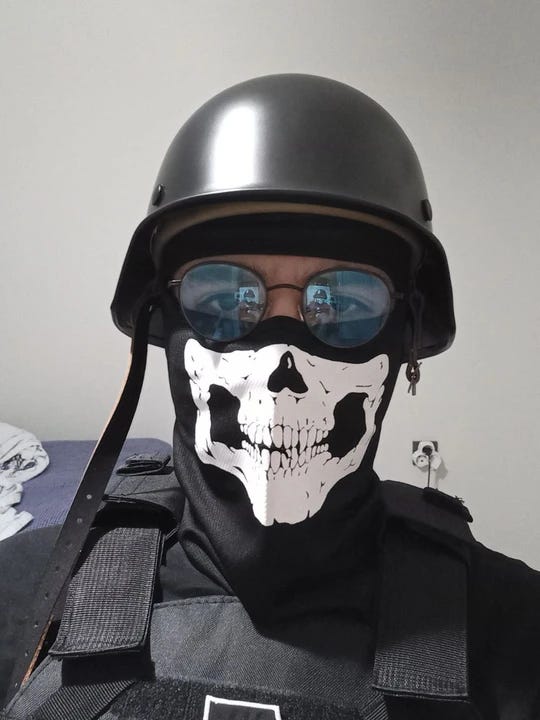We Need To Talk About Arda
Tracing the Cultural Roots of Neo-Fascist Violence in Turkish Youth
In 2024, 18-year-old Arda Kucukyetim carried out a violent attack he labeled "the beginning" in his manifesto. Inspired by notorious figures like Anders Behring Breivik and Brenton Tarrant—men whose neo-fascist ideologies led to mass killings—Kucukyetim’s violence was not an isolated outburst. It was part of a growing, radical trend. Just a year later, the individual who attempted to assassinate Donald Trump was also found to be an active participant in "Terrorgram," a network of Telegram channels where neo-Nazi youth have congregated since the closure of the Iron March forum.
An image of Arda Kucukyetim
Kucukyetim was born and raised in Eskişehir, Turkey. Turkish society has, for decades, glorified military service, often portraying soldiers who die in conflicts in Syria or Iraq as heroes. State-sponsored news outlets frequently broadcast emotionally charged images of mothers crying over the graves of their sons, reinforcing the nobility of dying for the nation.
Turkey’s ongoing operations in northern Syria and Iraq have been framed domestically as acts of national defense and pride. Every Turkish military death is treated as a national sacrifice, and the country’s long-standing internal conflict with Kurdish groups like the PKK has only deepened the normalization of perpetual war. The Turkish state apparatus actively cultivates a heroic image of the soldier, while dissent or criticism of military action is often criminalized.
In this context, the glorification of violence doesn’t just come from obscure online communities—it is mirrored by the state. The cultural overlap between state propaganda and fascist online ideology blurs the line between radical and patriotic. For someone like Kucukyetim, the leap from state-approved nationalism to militant accelerationism may not have felt like a leap at all.
Unlike previous generations, Gen Z radicalization happens predominantly online. In Turkey, platforms like Telegram, X, and fringe forums have become the new battlegrounds for ideology. Youth feeling alienated by political repression, economic instability, or a lack of meaning turn to digital spaces where identity and purpose are offered in the form of radical ideas and imagined heroism.
These platforms also broadcast the very violence they help perpetuate. Videos showing the killings of Turkish soldiers or attacks against perceived enemies accumulate millions of views—used alternately to provoke outrage or glorify sacrifice. The line between victim and hero is intentionally blurred, and the digital consumption of violence becomes part of the radicalization process itself.
An important aspect of Kucukyetim’s radicalization is the presence of online platforms that not only foster these extreme ideologies but also glorify violence. Encyclopedia Dramatica, a notorious and widely controversial wiki-style website, has long been a hotbed for neo-fascist, misogynistic, and generally hate-driven content. Originally created as a satirical site focused on internet culture, it has since become a breeding ground for the far-right, attracting users who share and amplify violent and extreme views.
Encyclopedia Dramatica functions as a space where far-right extremists, including those aligned with groups like the alt-right and neo-Nazis, post offensive and harmful content. The site’s culture thrives on mocking and dehumanizing its targets—often individuals or groups opposed to its ideologies, such as racial minorities, women, and LGBTQ+ individuals. It also provides a platform for "hero worship" around violent figures like Breivik and Tarrant, whose ideologies and attacks are celebrated in toxic, distorted forums.
In Kucukyetim's case, Encyclopedia Dramatica referred to him as a “failed hero,” showcasing a common reaction from such forums when young men attempt acts of violence. These online communities often frame individuals like Kucukyetim as martyrs who failed to execute their goals correctly, yet they remain part of a greater narrative that links them to larger, more successful attacks. This normalization of violence, paired with the reinforcement of extremist narratives, creates a culture where young men are encouraged to follow in the footsteps of past shooters or terrorists, contributing to the perpetuation of the cycle.
This brings us to a difficult moral reckoning. Why is it that the lives lost in Turkish-controlled areas of Syria or Iraq are seen as less significant than those killed in attacks at home? Why is Kucukyetim’s potential life sentence treated as justice, while the state justifies countless other deaths under the banner of national security?
The public reaction to domestic terrorism is sharp and swift—but the same moral scrutiny is rarely applied to state violence abroad. Lives lost outside the nation’s borders, particularly in regions occupied or surveilled by Turkish forces, are often minimized or omitted entirely from mainstream discourse. This selective mourning reveals a troubling hierarchy of human value and undermines any genuine attempt at preventing future violence.
If violence continues to be a source of identity, meaning, and glory—whether in the name of the state or extremist ideology—then banning Discord or policing speech alone will not prevent the next attack. What’s required is a cultural and political reckoning: a dismantling of the narratives that equate death with honor, and a serious look at how the state and society alike contribute to the radicalization of their youth.


